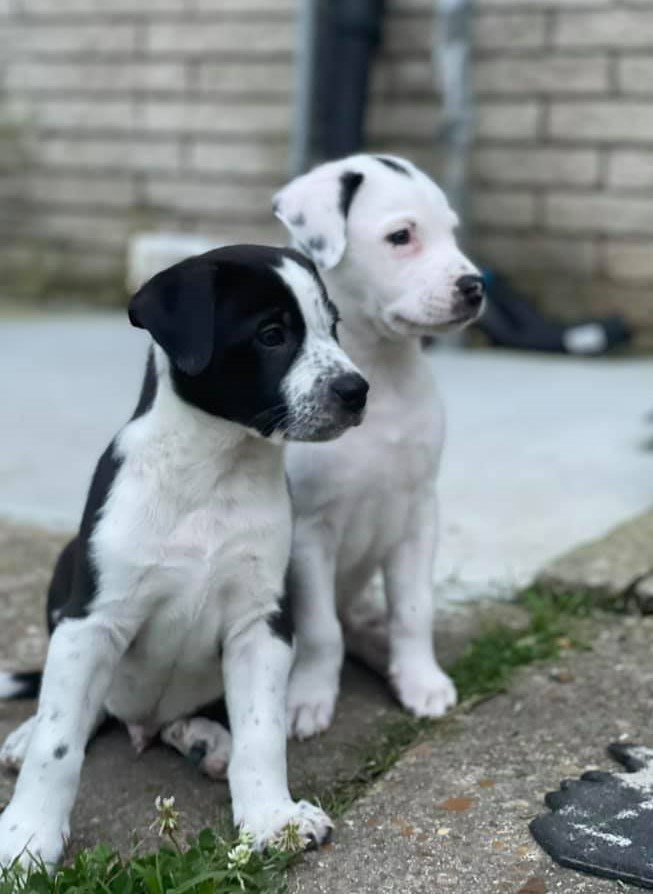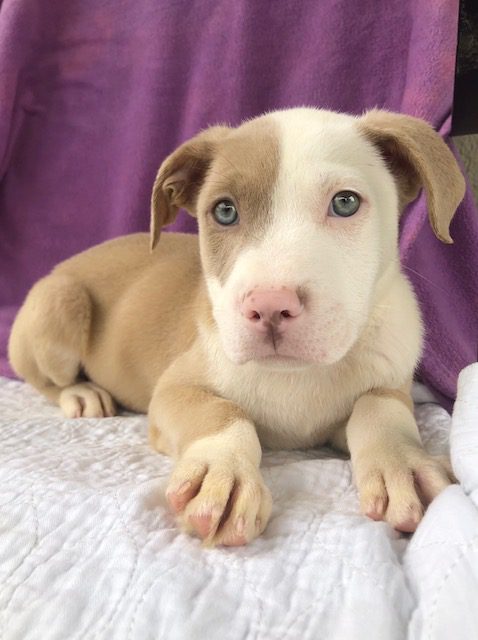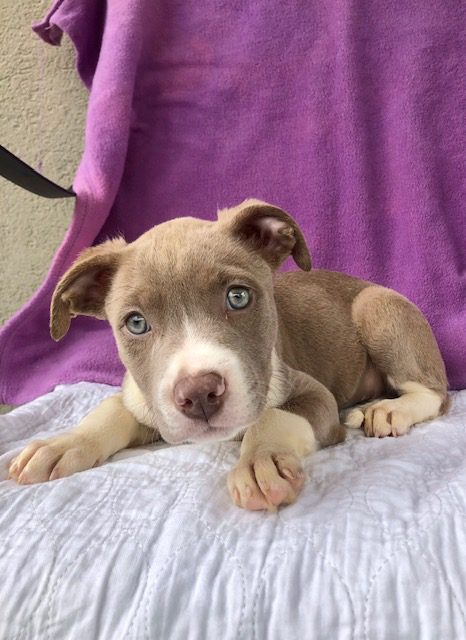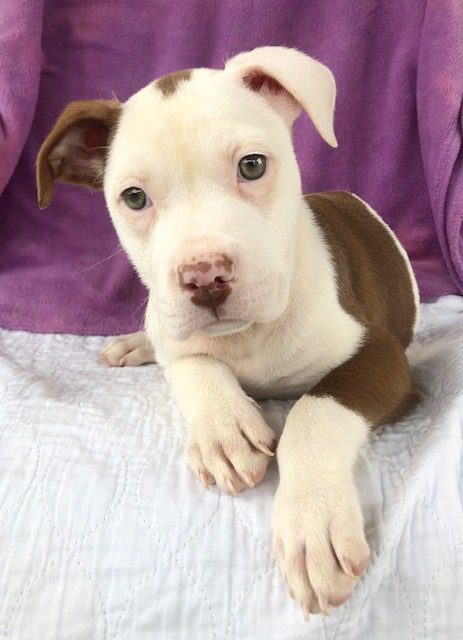We can all agree that puppies are irresistibly cute, full of boundless curiosity and endless feelings of the warm and fuzzies. The idea of influencing their experiences so that they grow into the dog of your dreams is extremely appealing to the average adopter but it’s important to think about what it actually means and requires to raise a puppy. Do you want a puppy? Your answer might be a resounding YES! But are you truly ready to take on all that it entails to have a puppy? Let’s find out and if not, what are some alternatives or ways that you can prepare?
At Acadiana Animal Aid puppies make up over half of our dog adoptions every year. Since January of this year almost 3/4th of the dogs that have entered our shelter have been less than 5 months old. This brings upon a greater discussion about overpopulation in our area but for now we want to make sure that this vulnerable population as well as our community as a whole is really set up for success when it comes to puppy care.
Long Term Commitment: What Does It Take?

The best way to set you and your puppy up for success is by managing your expectations, so let’s talk about what those expectations are. The reality is that it takes months to build a communicative relationship between you and your dog and likely a full year before your pup will be able to understand what it is you want from them. However, that time frame varies based on how consistent your efforts are. There is a lot to think about when adding a puppy to your family and for starters there’s potty training, teething/play biting, socialization, leash training, and overall encouraging the right developmental behaviors and preventing the inappropriate ones.
If you go into it thinking this is just a few weeks of work or that unwanted behaviors will naturally subside or even just the idea that after a few months your dog should then just “know better,” then you’re going to run into trouble. Puppies require an ample amount of time, the acknowledgement that they will one day grow into teenage dogs that need routine exercise and the ability to take ownership of how they act once they’re fully fledged adult dogs. It is your responsibility to work with your puppy on a daily basis, not only so that your dog doesn’t later add stress to your home but also doesn’t pose an issue to the community, public judgment and a generalized negative view on breeds or dogs as a whole. If you raise a puppy to an adult and then discover that they are unmanageable, that’s on you as the owner.
It is best to assume that for the first year of a dog’s life it is imperative that you commit to flawlessly controlling their environment. This includes what they have access to and when. By managing their surroundings you can prevent accidents, destruction and keep them safe. It is highly recommended that any time you can’t supervise your puppy they are kept in a safe, secure location (preferably a crate, puppy play pen, etc) with zero access to things that might cause unwanted behavior. I often recommend puppy parents keep them on leash even when indoors so that you might easily be able to correct misbehavior and manage their surroundings to a T. At the end of the day the actions of your puppy are one hundred percent your responsibility.
Consistency, Time and Patience!
Let’s talk about potty training. How long do you think it’ll take to house train a new puppy? A lot of people come to our shelter with the expectation that a young puppy will arrive home with full comprehension of environmental rules set by us humans in the matter of a few weeks. However, while some puppies learn fast, it is safer to assume this concept will take months of routine management. Again, set realistic expectations when bringing a puppy or ANY new dog into your home. Dogs are smart but understanding that all indoor spaces are universally unacceptable areas for potty is another thing that will require reinforcement and building of communication between you and your dog. For some dogs it can take over a year before they get the hang of things while others seem to master the foundational rules within the first couple of months. Regardless, GO SLOW.
Most puppies should be taken out very frequently! If you’re at work or can’t commit to frequent potty breaks, it’s your job to set them up with appropriate alternatives (puppy pads, crate training, play pens, etc.). There will inevitably be setbacks when it comes to house training. It is all too common for puppy owners to have that one week stretch of no accidents, start feeling overconfident enough to let their guard down and then suddenly it’s happening again. This only builds frustration so when in doubt, go into it with the anticipation of those setbacks. If you have to ask yourself, “should I take my puppy out?” The answer is yes. It’s easy to start feeling confident when you reach two, three weeks without accidents but training is not linear and puppies are learning and growing all the time. It’s important to not put too much pressure on them getting it perfect. Don’t scold your puppy when they mess up, it’s your job to be proactive and patient with the training process. You want to prevent future acts instead of punishing mistakes.
Is that something you have the time and energy for? Can you invest in the tools necessary to help this process along (crate, baby gates, play pens, puppy pads, etc)? And worse case scenario, how will you tolerate accidents and misbehaviors that will inevitably occur?

Let’s be honest, for those of you who don’t know, puppies bite. Most people might anticipate the months of teething but it’s important to acknowledge that puppies also use their teeth to explore the world, initiate play, and to defend themselves. Excessive puppy biting is NORMAL. It is not a sign of aggression but rather immaturity. It’s extremely important not to mislabel a puppy’s behavior as it could be to the detriment of the puppy and lead to improper training. Puppy adopters should expect play biting to occur and be prepared with how to humanely teach them in a way that betters their behavior.
All puppies need to learn something called bite inhibition, which is to control the strength of their jaw. This is something that can be incredibly difficult to overcome and demands an abundance of self control on your part as well by being able to avoid play with your hands, overexcitement/overstimulation, and accidentally encouraging the use of their mouth when it’s not appropriate. One of the best ways to combat teething/biting is to have a wide variety of different textured toys available, designed for chewing, playing, and training. When a dog puts their mouth on your hand, ankle, etc. it’s best to have tools readily available (at all times of interaction) to redirect those needle sharp teeth onto the correct alternative. You should also be able to invest in age appropriate exercise for your dog that will target their physical and mental energy. A tired puppy is a happy puppy and way less likely to get into trouble! At the same time, encouraging calm, quiet time and interactions is just as important for a well balanced puppy.
Is this something you will have the patience to train? Puppy parents should understand that this takes time. You will need to stay enthusiastic, consistent, and whatever you do, don’t give up. If you find yourself becoming frustrated when your puppy is testing your limits it’s your job to walk away, create space, and secure your dog to a crate so that interactions remain positive. Puppies whose play biting is left untrained and unmanaged grow into bigger, stronger dogs with even more problem behaviors.
Puppies: Guaranteed To Keep You On Your Toes

You’ll need to plan on training your puppy not to jump up on people, not to counter surf (steal food from countertops), pull on leash, chew furniture, or other unruly behavior that you might foresee as being challenging to deal with, with an adult dog. These are all naturally occurring obstacles that will come as your dog ages, discovers what their capabilities are, and their desire to explore all that you give them access to. Dogs are incredibly receptive to learning anything you want to teach them and it can be so much fun! But it’s also very time consuming, because no matter what kind of day your having your puppy is going to need your attention.
Remember, the energy level of your puppy will change and fluctuate too! Many adopters are deceived by the sleepy, lazy puppy only to find out days, weeks or months in that they’re way more energetic and rambunctious than anticipated. They’re young! They’re growing! They WILL need appropriate ways to release their energy. Dogs have been bred for thousands of years to work and it is not fair for us to ever expect for them to just “calm down.” Don’t want a hyper dog? Perhaps don’t consider a puppy. Their personalities may evolve and change too! Puppy adopters should honestly be prepared for anything.
Are you patient enough to train a stubborn, relentless, energetic puppy? Can you identify when your personal frustrations are getting in the way of proper training? Will you be able to set boundaries where necessary?
Older Dogs Are Just As Cute!


If you’re looking for a couch potato, adopt an adult dog. If you’re looking for a house trained companion, adopt an adult dog. If you don’t have the time to train a puppy, adopt an adult dog! You won’t regret it, trust us. Puppies are cute and wonderful additions to any family, but it’s important to remember that they all grow up.
In addition to all of the training and supplies, a puppy’s medical care does not stop when you leave the shelter. All dogs adopted from Acadiana Animal Aid are spayed/neutered, microchipped, dewormed and up to date on preventions and vaccinations. However, puppies require booster vaccines every two to three weeks until they are roughly five months old and like every dog of every age, heartworm prevention is a must have year round in the south. Puppies are susceptible to intestinal parasites and may need additional deworming should they contract anything. Please be sure to consult with your personal veterinarian in order to have a full understanding of what will be involved in terms of routine medical care.
Still Undecided? Consider Fostering First!
Bringing a puppy home for the first time is super exciting and often a joyous occasion for the whole family. I love the joy on every adopter’s face when they find the perfect fit for their home. Seeing that connection and the positive impact of bringing people and animals together is why we are here. We WANT you to have the dog of your dreams so never be afraid to admit to what you can and can’t handle before making a commitment.
If you still aren’t quite sure if a puppy is the right decision for you then please consider fostering. Already this year alone Acadiana Animal Aid has had around 400 dogs enter foster homes and 81% of them have been PUPPIES. Fostering is an excellent way to test the waters and to find out just what you can reasonably handle with zero commitment involvement or financial burden. It’s better to make the most informed decision you can for not only yourself but for the long term well-being of the puppy and EVERY dog that is relying on us.



